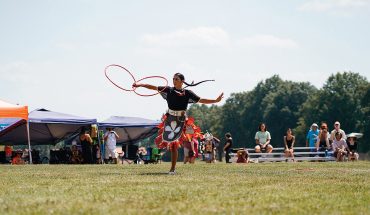by Cokie Roberts
One little-known moment in Raleigh history might be my favorite. It was New Year’s 1803, when John Marshall arrived in the newly established state capital only to discover he had set off to ride the court circuit without any breeches.
In something of a panic, the chief justice described his predicament: “I immediately set out to get a pair made. I thought I should be sans culotte only one day” – but he found all the tailors in town too busy to help him. “I have the extreme mortification to pass the whole term without that important article of dress I have mentioned.” What do we suppose he was wearing? Ever since I read that letter I find myself averting my gaze when I pass a portrait of the great jurist. There’s only one person Marshall could have admitted “mortification” to – his wife Polly.
That’s why letters to and from women give us a more complete understanding of history. When the men wrote to each other, they were very aware that their documents would be preserved and published, so they carefully crafted their missives, often lacing them with pedantry or pomposity. But when they communicated with their wives, sisters, mothers and female friends, they let down their guard, penning franker, funnier and more fully human descriptions of the events and emotions in their lives. Those letters color in the pictures of the men we study in school and continue to marvel at through their numerous and best-selling biographies. Though we usually see them depicted as deities in bronze and marble, when you read what the men had to say to the women, and especially when you read what the women said to and about the men, you get to know the founding fathers as flesh and blood human beings.
That’s not to take anything away from those remarkable men. Quite the contrary, I think it makes them much more admirable. It’s easy for deities to do extraordinary things – it’s much harder for humans with all of our flaws and foibles. As someone who has covered politics and Congress for decades, I’ve spent a great deal of time with the founders, dissecting what they thought about such subjects as the right to bear arms or the place of religion in the public square. Over the years as I became better acquainted with the men, I wanted to get to know the women in their lives. What were they up to while the men were off creating a country? That curiosity led me to start reading their mail.
Women’s letters often bounce all over the place from fashion to foreign policy. Here’s a typical one from Dolley Madison written not long after the British burned Washington in 1814. With the White House in ashes, the first lady would soon be moving “into an empty house” so she asked a friend whose house was for sale if she could buy some beds which were “scarce and dear.” While she worried about furnishing a new home, Mrs. Madison also fretted over affairs of state: “The fate of New Orleans will be known today – on which so much depends.” And she reported on friends and family: “Mr. Rush is still very low…Anna has had a sick family all the winter.” One short page reports on the political, economic and social situation at the moment.
Raleigh’s Sarah Gales Seaton
These women’s letters are just plain fun, as well as telling about the times. Young Sarah Gales Seaton, bride of a Washington newspaperman, couldn’t wait to tell her mother in Raleigh about the New Year’s day party at Dolley’s White House where the heat of the crowd ruined the faces of the dolled-up ladies: “the rouge which some of our fashionables had unfortunately laid on with an unsparing hand, and which assimilating with the pearl powder, dust and perspiration, made them altogether unlovely to soul and eye.” It’s such a vivid picture!
Particularly vicious views of their political enemies emerge from these unfettered female outpourings. Jefferson Davis’s wife Varina held such a low opinion of Illinois Senator Stephen Douglas that she was distressed to learn that the pretty and popular Adele Cutts had agreed to marry him. Varina told her parents in 1856 that she was relieved a new water supply would soon be available in Washington so that “sparing his wife’s olfactories Douglas may wash a little oftener.” Ouch.
Varina’s on my mind because of the new book I’m working on about how the Civil War changed women’s lives. She went from being a pre-war “belle” and somewhat submissive wife (though often chafing at the role) to a post-war journalist on the New York scene, where she formed a friendship with the wife of Ulysses S. Grant. Along with many of her cohorts in antebellum Washington, she ended up as a purposeful professional supporting social change. I knew nothing about this momentous upheaval before I started reading the revealing stories written by women.
Those stories can by tough to come by. Many letters that we would love to have, like the correspondence between George and Martha Washington and Thomas and Martha Jefferson, were destroyed – sometimes by the women themselves – or simply packed away in boxes or trunks and forgotten. Scholars have spent centuries diligently annotating every utterance of the famous men in our history, while the words of women have too often gone unrecorded, even though those words usually give us more texture as they complete the picture of a time and place.
So take a look around the attics and basements in the family. You never know what treasures might be hiding there. Who knows? Somebody else famous might have been riding around Raleigh without any breeches.
 Cokie Roberts has recently put her habit of reading other people’s old mail to good use in the research and writing of Founding Mothers: Remembering the Ladies. The illustrated book for children ages 7 to 12 was published in February and became an immediate New York Times bestseller. It distills her longer book, Founding Mothers: The Women Who Raised Our Nation, into vignettes appropriate for youngsters, but also for the oldsters who love them – and love history, too.
Cokie Roberts has recently put her habit of reading other people’s old mail to good use in the research and writing of Founding Mothers: Remembering the Ladies. The illustrated book for children ages 7 to 12 was published in February and became an immediate New York Times bestseller. It distills her longer book, Founding Mothers: The Women Who Raised Our Nation, into vignettes appropriate for youngsters, but also for the oldsters who love them – and love history, too.




